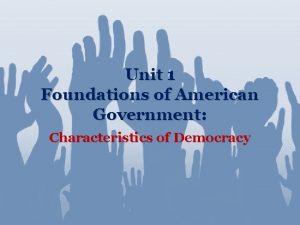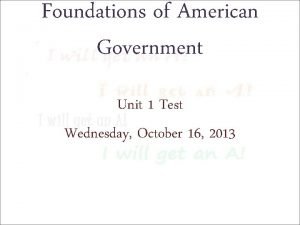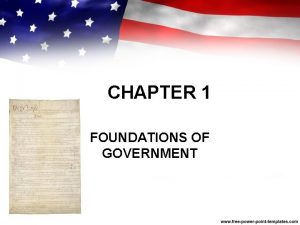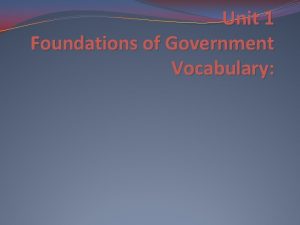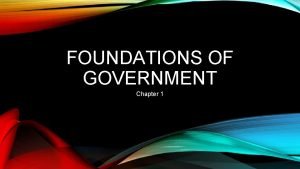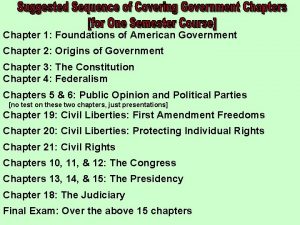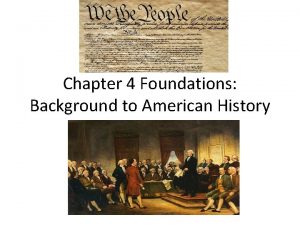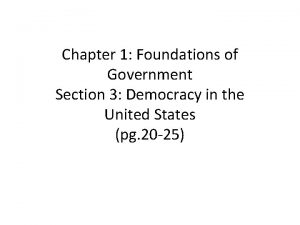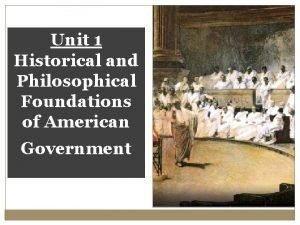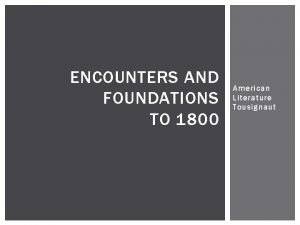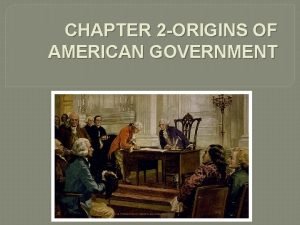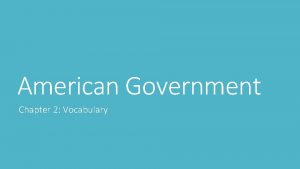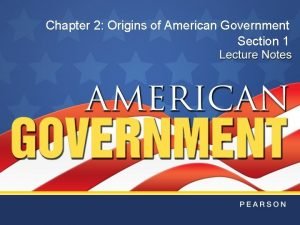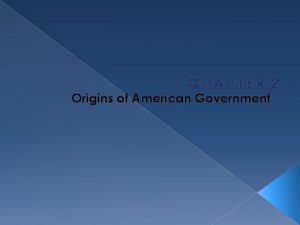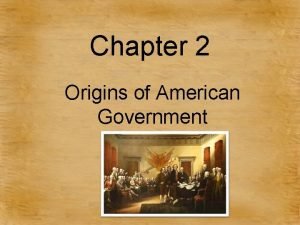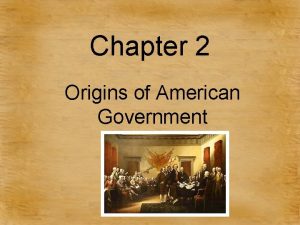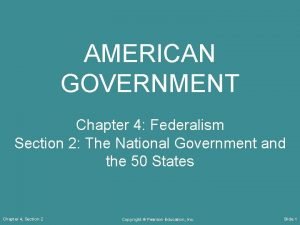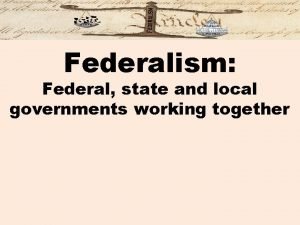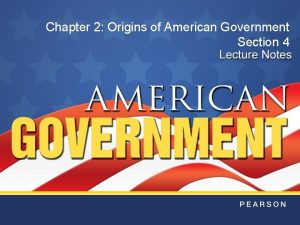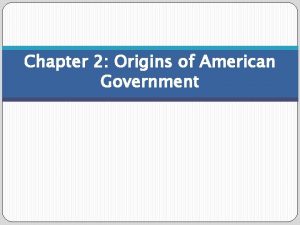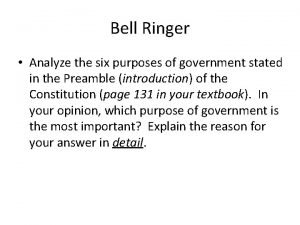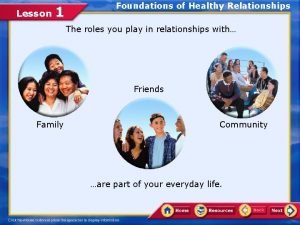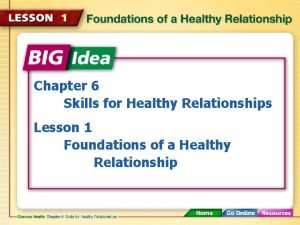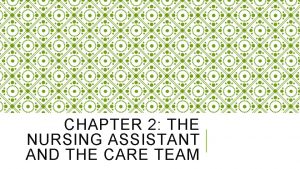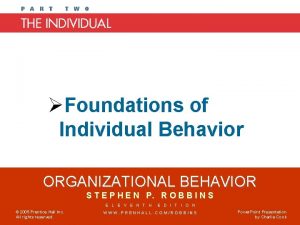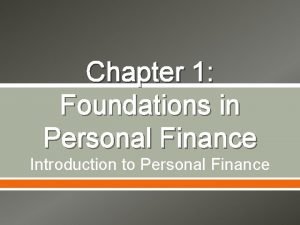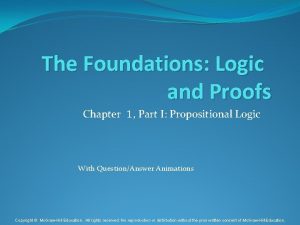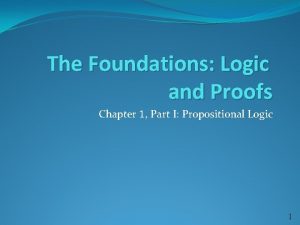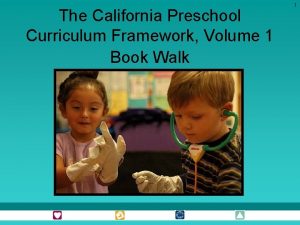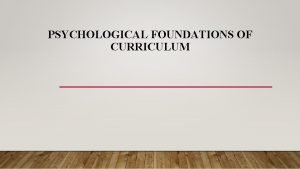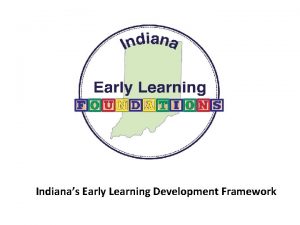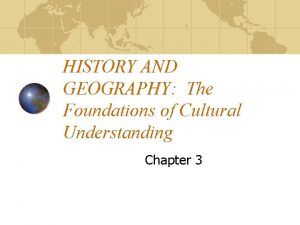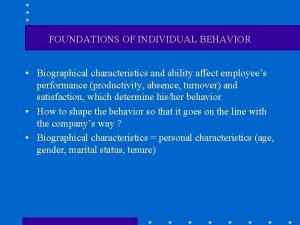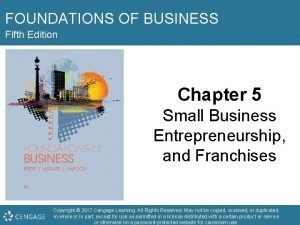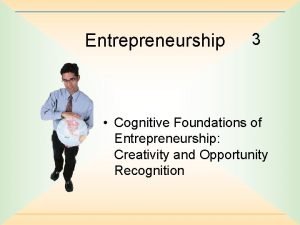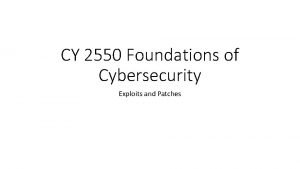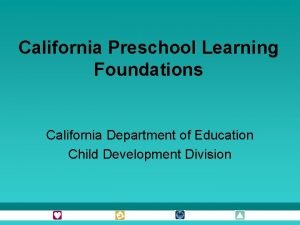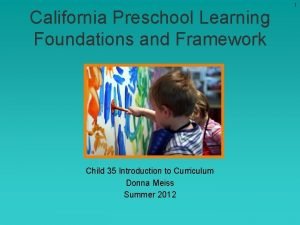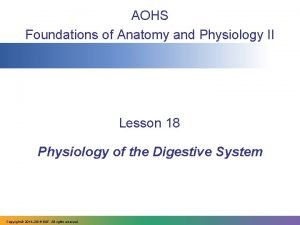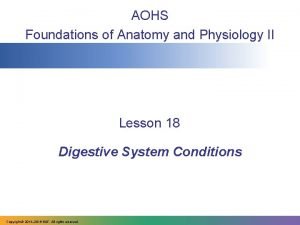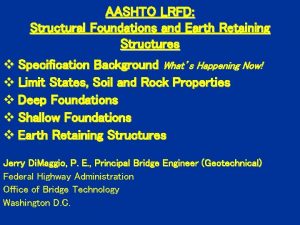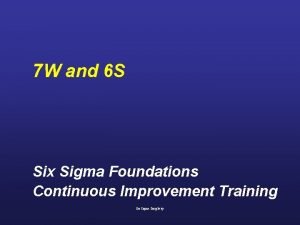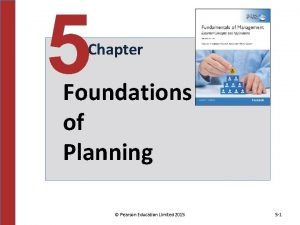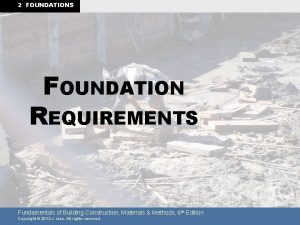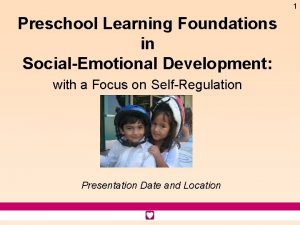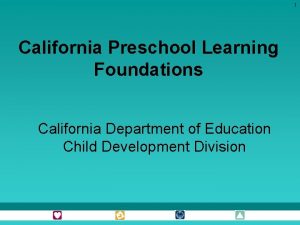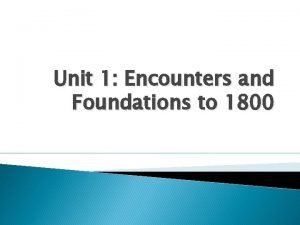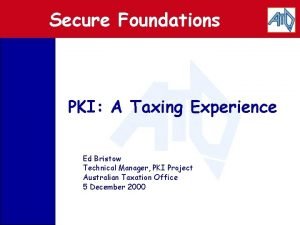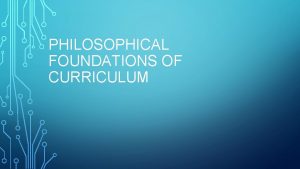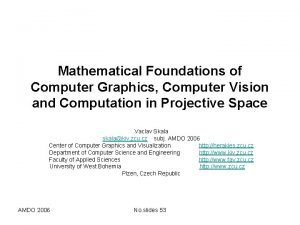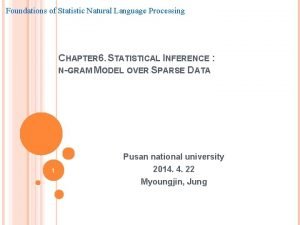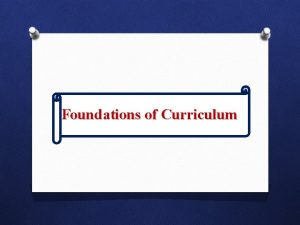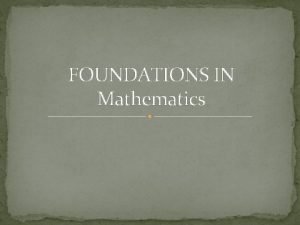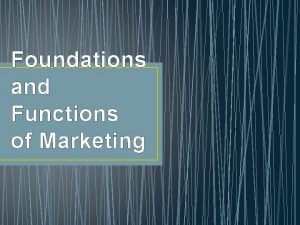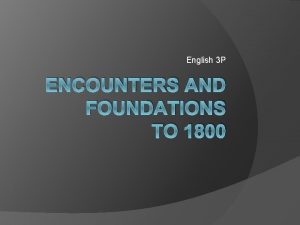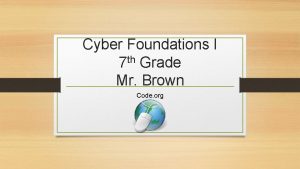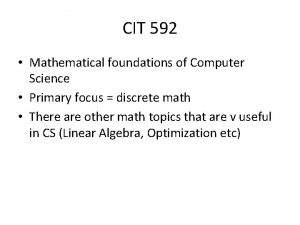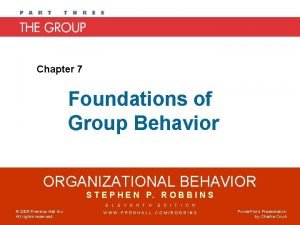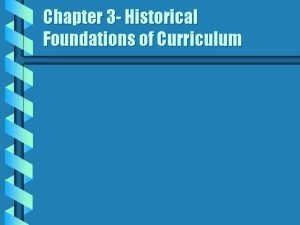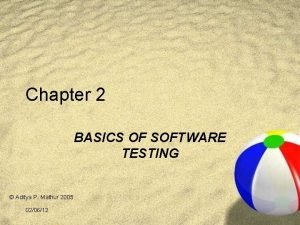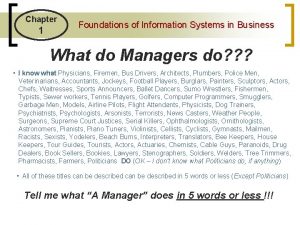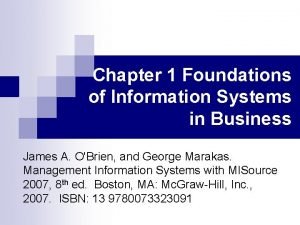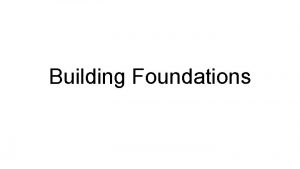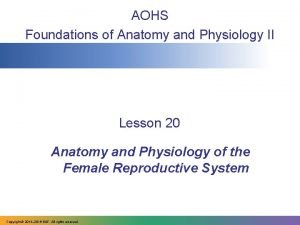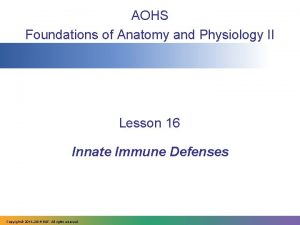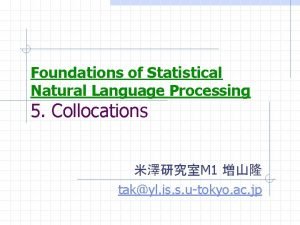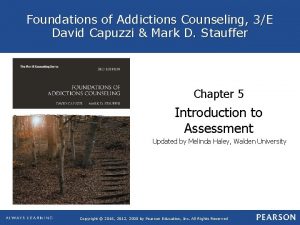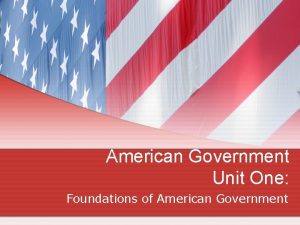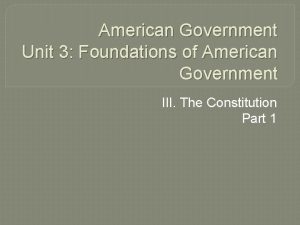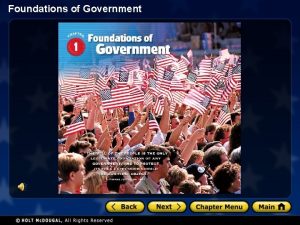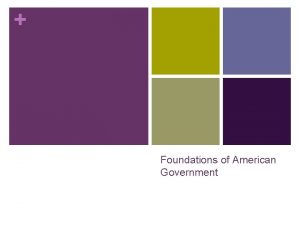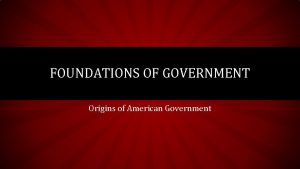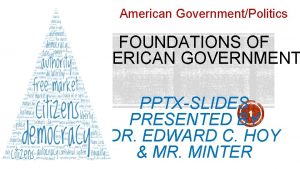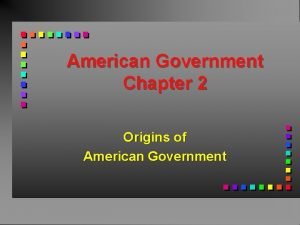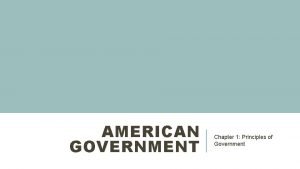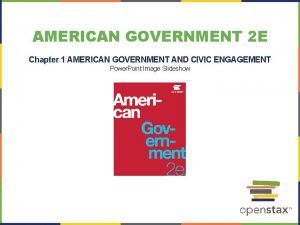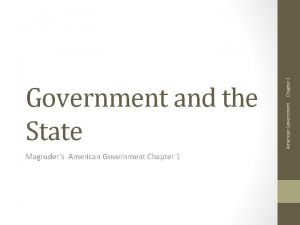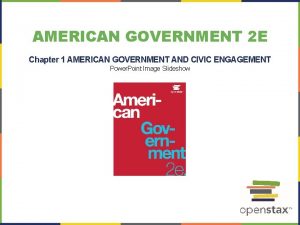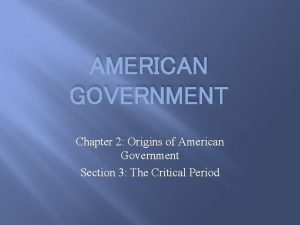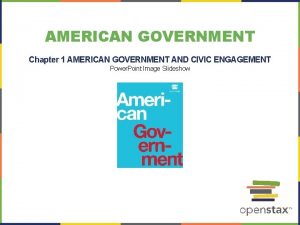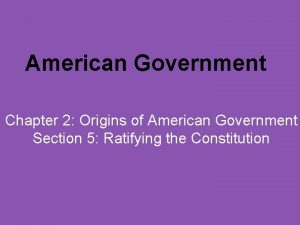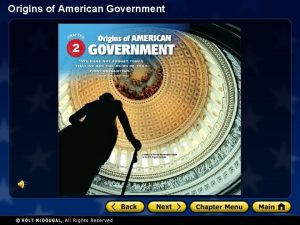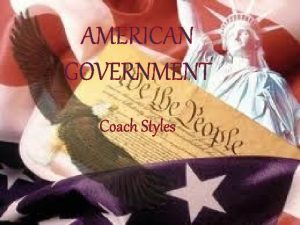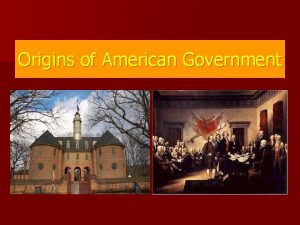Chapter 1 Foundations of American Government Chapter 2







![Forms of Government [Where is the power? Unitary, Federal, Confederacy] France Sov. Union Three Forms of Government [Where is the power? Unitary, Federal, Confederacy] France Sov. Union Three](https://slidetodoc.com/presentation_image_h2/69bda8899aff95b1740f1852bcdd1b98/image-8.jpg)











![Four Theories of How Government Developed [continued] 123. Divine Right Theory – authority from Four Theories of How Government Developed [continued] 123. Divine Right Theory – authority from](https://slidetodoc.com/presentation_image_h2/69bda8899aff95b1740f1852bcdd1b98/image-20.jpg)
![Four Theories of How Government Developed [continued] 16 4. Social Contract Theory – the Four Theories of How Government Developed [continued] 16 4. Social Contract Theory – the](https://slidetodoc.com/presentation_image_h2/69bda8899aff95b1740f1852bcdd1b98/image-21.jpg)
![Hobbes [continued] The government enforces order by wielding what Hobbes called the “sword of Hobbes [continued] The government enforces order by wielding what Hobbes called the “sword of](https://slidetodoc.com/presentation_image_h2/69bda8899aff95b1740f1852bcdd1b98/image-22.jpg)
![Hobbes [continued] In his focus on life in the cruel state of nature, Hobbes Hobbes [continued] In his focus on life in the cruel state of nature, Hobbes](https://slidetodoc.com/presentation_image_h2/69bda8899aff95b1740f1852bcdd1b98/image-23.jpg)

![John Locke [continued] The government should rule, rule not by force, but by consent John Locke [continued] The government should rule, rule not by force, but by consent](https://slidetodoc.com/presentation_image_h2/69bda8899aff95b1740f1852bcdd1b98/image-25.jpg)



![The Purpose of Government [1] 1. To Form a More Perfect Union [In union The Purpose of Government [1] 1. To Form a More Perfect Union [In union](https://slidetodoc.com/presentation_image_h2/69bda8899aff95b1740f1852bcdd1b98/image-29.jpg)









![6. *To Secure the Blessings of Liberty [not subject to restrictions] Freedom is necessary 6. *To Secure the Blessings of Liberty [not subject to restrictions] Freedom is necessary](https://slidetodoc.com/presentation_image_h2/69bda8899aff95b1740f1852bcdd1b98/image-39.jpg)



![Focus 1. Distinguish between unitary, federal, and confederate governments [geographical distribution of power] 2. Focus 1. Distinguish between unitary, federal, and confederate governments [geographical distribution of power] 2.](https://slidetodoc.com/presentation_image_h2/69bda8899aff95b1740f1852bcdd1b98/image-43.jpg)




![22 23 Confederate Government [Confederation] – the opposite of a unitary state where an 22 23 Confederate Government [Confederation] – the opposite of a unitary state where an](https://slidetodoc.com/presentation_image_h2/69bda8899aff95b1740f1852bcdd1b98/image-48.jpg)
![3. 26 Federal Government [Federation] – a compromise between a unitary state and a 3. 26 Federal Government [Federation] – a compromise between a unitary state and a](https://slidetodoc.com/presentation_image_h2/69bda8899aff95b1740f1852bcdd1b98/image-49.jpg)


















![Note Sheet – Foundations of American Government [Review] state is a country or nation Note Sheet – Foundations of American Government [Review] state is a country or nation](https://slidetodoc.com/presentation_image_h2/69bda8899aff95b1740f1852bcdd1b98/image-68.jpg)




- Slides: 72

Chapter 1: Foundations of American Government Chapter 2: Origins of Government Chapter 3: The Constitution Chapter 4: Federalism Chapters 5 & 6: Public Opinion and Political Parties [no test on these two chapters, just presentations] Chapter 19: Civil Liberties: First Amendment Freedoms Chapter 20: Civil Liberties: Protecting Individual Rights Chapter 21: Civil Rights Chapters 10, 11, & 12: The Congress Chapters 13, 14, & 15: The Presidency Chapter 18: The Judiciary Final Exam: Over the above 15 chapters

Government

1. How many senators are there? 100 - 2 from each state Ted Cruz John Cornyn 2. Who are the two senators from Texas? _________ & ______. 3. What is the salary of a senator? a. $25, 000 b. $100, 100 c. $174, 900 d. 203, 100 435 4. How many representatives are there? _____ 538 – 3 from DC 5. How many electors are there? _______ 6. How many electoral votes does it take to win the presidency? _____ 270 CA - 52; 7 sts have 1 7. What state is largest in population and has the most reps? _________ 32 – 30 in House and 2 in Senate 8. How many reps does Texas have? _______________. 9. How old do you have to be to run for the House? _____ 25 Senate? __ 30 John Boehner 10. Who is Speaker of the House? _____ 35 11. How old does a person have to be president? _____ 12. How many terms may a president serve? _____ 2 13. What is the salary of the President? a. $25, 000 b. $200, 000 c. $400, 000 14. Which political party generally is considered liberal? Democrat _______ 9 15. How many justices sit on the Supreme Court? _____ B. Ginsberg, Sonia Sotomayer, & Elena Kagan 16. Name the female S. C. justices. Ruth _____________ 17. How long is the term of a Supreme Court Justice? _____ Life 18. Bonus: About how long does it take you to eat a soft taco at Taco Bell? _____

The New Citizenship Test For those of us who weren’t born here, its never been easy to become a citizen. As of October 1, 2011, in addition to passing a reading and writing test of English proficiency, all immigrants must pass a new civics exam. The civics test is an oral exam, with an Immigration Services (INS) officer asking the application 10 questions from a list of 100. All applicants must answer 6 of 10 questions correctly to pass the exam. Electoral college 1. Who elects the President of the United States? _______________________ 2. How many amendments are there in the Constitution? ____________________ 27 Legislative, executive, and judicial 3. What are three branches of our government? ______________________ 4. Who makes the laws in the United States? Congress ________________________ 100 5. How many Senators are there in Congress? ________________________ Ted Cruz & John Cornyn 6. Can you name the two Senators from your state? ______________________ 6 years 7. For how long do we elect each Senator? _________________________ 435 8. How many representatives are there in Congress? _____________________ 2 years 9. For how long do we elect the Representatives? _______________________ Bill of Rights 10. What are the first 10 amendments to the Constitution called? _________________ Roberts 11. Who is the Chief Justice of the Supreme Court? John __________________ Patrick Henry 12. Who said, "Give me liberty or give me death. " _______________________ Jefferson 13. Who was the main writer of the Declaration of Independence? Thomas ________________ 1776 14. When was the Declaration of Independence adopted? ___________________ Francis Scott Key 15. Who wrote “The Star Spangled Banner”? ________________________ Abe Lincoln 16. Who was the President during the Civil War? _______________________ George Washington 17. Who is considered the father of our country? _______________________ Congress 18. Who has the power to declare war? ___________________________ 1787 19. In what year was the Constitution written? ________________________ President 20. Who becomes President of the USA if the President dies while in office? Vice ____________ Speaker of the House 21. Who becomes president of the if the President & Vice President should die? ___________ Life 22. A person who is nominated and confirmed for the Supreme Court serves for how long? _______ 2 terms of 4 years 23. How many terms may a President serve? ________________________ Austin 24. What is the capital of your state? ____________________________ Bonus:

Creating A Government 1. 2. 3. 4. 5. 6. 7. Name of country Currency [both coins and paper money] National Anthem Flag Style of government Role of the government in the economy Preamble [purpose of government] [Presentation should be appropriate for the classroom] *Grade will be based on participation of each member and presentation to the class.

Definitions – Chapter 1 Texas Djibouti Theory Summary Force Evolutionary Strong person or group took control of others. State developed after early families chose to settle land become tribes. God gave those of royal birth the right to rule. State exists because people voluntarily organized themselves to improve their lives. Divine Right Social Contract

Definitions – Chapter 1 1. Government – institution that makes & enforces public policy. They use imprisonment & execution to control human behavior within their territory. 2. Sovereignty – political independence or absolute power within its boundaries. 3. Popular Sovereignty – rule by the people. People are the source of all power. People are source of power [The group makes each individual stronger] 4. Divine Right Theory – ruler’s authority comes from God. 5. Social Contract Theory – the state exists to serve the will of the people. The people are the source of political power. (Hobbes and Locke)
![Forms of Government Where is the power Unitary Federal Confederacy France Sov Union Three Forms of Government [Where is the power? Unitary, Federal, Confederacy] France Sov. Union Three](https://slidetodoc.com/presentation_image_h2/69bda8899aff95b1740f1852bcdd1b98/image-8.jpg)
Forms of Government [Where is the power? Unitary, Federal, Confederacy] France Sov. Union Three Forms of Geographical “G”s [geographical distribution of power] [“What parts of government hold power? ”] 6. Unitary Government – central G has all the powers & local governments get their power from the central G. [most nations] [France, Gr. Britain, & Israel] 7. Confederate “G”(confederation)-an alliance of independent States give certain powers to a central government. The states retain their sovereignty, which means that each has supreme authority within its boundaries [Articles of confed. 1781 -1789] 8. Federal G(Federation)-G powers are divided between a nat’l G and a local G(states). The states are independent but co-equal. G This is a compromise between unitary G and a Confederate G [U. S. ]

relationship Presidential between the executive & legislative branches? Parliamentary What is the 2 forms of Representative Democracy Presidential and Parliamentary Forms of Government Presidential Legislature Chief Exec Legislature Independent and Coequal Chief Exec Parliamentary responsible to and holds office at pleasure of legislature [9 & 10 – How the legislative ( lawmaking) & executive (law-enforcing) share power] 9. Presidential Government - separation of government powers between the legislative & executive branches. (U. S. ) 10. Parliamentary Government – chief executive must come from the legislative branch (Parliament). Most countries have parliamentary government. David Cameron Great Britain

Number Of People Who Hold Power Dictator Democracy – mass participation 11. Dictatorship – one person has unlimited power. [Libya] A. Authoritarian – controls political behavior of its citizens. Citizens do have freedom in every thing except politics. B. Totalitarian – controls every aspect of its citizen’s lives. There are labor camps or mental hospitals for dissidents. There are laws, rules and regulations that guide every aspect of individual behavior. [Nazi Germany] 12. Democracy – rule by the people. A. Direct democracy – mass participation by citizens in government. [Greek city-states] B. Indirect Democracy (Representative) Representative [Republic] Republic – representatives represent us. The elected officials are expected to represent the voter’s views and interests. [U. S. – each of the 435 reps represent 610, 000 people]

Chapter 1. Foundations of American Government Section 1. Government and the State Section Focus: Focus 1. What are the four basic characteristics of a state? state 2. What are the four theories on the origin of the state? state 3. Why does government exist? exist Test Questions Cuba 1 state– state country or nation [has sovereignty (political independence)] sovereignty 2 State – one of the 50 States [do not have sovereignty] Alaska *state – people living in a territory, organized politically and having the power to make & enforce law. [about 200 states]

*What is Government? You will be fined for not wearing a seat belt 3 1. Government is the institution that makes and enforces public policies [all those things a government decides to do such as the income tax, minimum wage law, etc. ] [Government is the oldest of human inventions. ] 4 2. Government consists of lawmakers, administrators, and judges. [What would life be like if there were no government (no police, public schools, or courts)] 3. Do we need a government? How is government involved with your personal life that you don’t agree with? Should they be involved in matters of personal safety [protective helmets, seat belts]?

All governments must have three types of power: Legislative (make laws/ public policy) Executive (carries out/ enforces laws) Judicial (interprets/ decides fairness of laws) These powers are commonly found in a constitution which sets out the laws and principles of a government. Do these powers have to be independent or separately held by different government bodies? NO!!! Authoritarian Governments Dictatorships - Hitler, Stalin, Mao, Castro, Saddam Hussein Oligarchies some monarchies, South Africa -20% of the population (whites) controlled 80% of the population (blacks). Democracy/Republic Ultimate power belongs to the citizens!

An institution (or a tool) which those with power use to carry out public policies. What are public policies? Plans of action created by the government that deal with a variety of issues. In order for governments to exist, they must have authority or power, which is the ability to produce effects on others or the potential to influence others [e. g. power over nations, states, cities, schools, classrooms, athletic teams, gangs, individuals].

The life of man, solitary, poor, nasty, brutish, and short. Thomas Hobbes There are many views on why government is important: Thomas Hobbes, Hobbes author of the Leviathan, suggested that governments are needed because without it, we would all be in the “state of nature”, warring against each other to no end… we would seek out our own self interests, much like animals, without enforceable laws to constrain us. In other words, according to Hobbes, the government provides us with fear of being punished if we break the law (and that is a good thing), so citizens are less inclined to do harm to others. The absence of government is known as “anarchy”… the state of nature! With anarchy there are no laws, and therefore no consequences to doing harm to others.

*Four Characteristics of a state 1. *Population Smallest in population: Nauru (now rue), rue a Pacific island state (one of the 207 countries) has only 10, 287 people. [Coral island just south of equator] They lead the world in Type II diabetes. [95% of adults] The second smallest is San Marino [next to Italy], which has 22, 000 people. It claims to be the oldest state in Europe, going back to 301 A. D. 6 The largest in population: China, China at 1. 3 billion is the largest state. Every 2 seconds, another Chinese is born; so every minute there are 30 more. Every hour, 1, 800 are born; that’s 43, 000 per day. 1, 300, 000 are born every month; that’s over 16 million a year. . 5 2. *Territory The smallest in territory is Nauru at 8 square miles. Phosphates (fertilizer from bird droppings) makes mining important here. 2 nd is San Marina at 24 sq. mi. Nauru 7 The largest in territory is Russia which is about 6. 6 million sq. mi. which is 1/6 the land surface of the earth. [U. S. is 3. 7 mil. sq. miles]


3. Sovereignty 8 Sovereignty means political independence or absolute power within its “territorial boundaries. ” Each state decides its own policies. In theory no state has the right to interfere with the internal affairs of another state. by the people] Sovereignty – people are the only Popular 9 Popular(rule source of government. Government must be conducted with the consent of the people. The location of sovereignty (people (democracy) or a dictator] is very important. . 5 4. Government *Government is a political organization. Over 200 states have governments (machinery & personnel by which a state is ruled). Government is the agency the state uses to exert its will and accomplish its goals.

*Four Theories of How Government Developed 101. *Force theory – established through force. The state was developed by force as one strong person or group conquered a given territory, territory and then forced everyone living in their territory to submit to their will. When this happened, all essential parts of the nation state were in place - people, people territory, territory government [political organization], and sovereignty [power within its own territory]. Early Family Clan Tribe went from Agricultural society Government early family [simple government] to the clan, to the tribe, to agricultural society [could settle down and not be a nomad], then to government. 11 2. *Evolutionary Theory –
![Four Theories of How Government Developed continued 123 Divine Right Theory authority from Four Theories of How Government Developed [continued] 123. Divine Right Theory – authority from](https://slidetodoc.com/presentation_image_h2/69bda8899aff95b1740f1852bcdd1b98/image-20.jpg)
Four Theories of How Government Developed [continued] 123. Divine Right Theory – authority from God. “God gave those of royal birth the right to rule. ” This was the most universally accepted rule of the 17 th & 18 th century. During the Middle Ages many European monarchs and church officials asserted that the right to rule came directly from God. Therefore, these rulers were able to justify assuming hereditary, absolute power over their peoples. People who criticized or opposed the government were often accused of treason or heresy. Today, the monarchs of Saudi Arabia are among the few rulers who claim they have a divine right to rule. So, religion is the basis of their authority.
![Four Theories of How Government Developed continued 16 4 Social Contract Theory the Four Theories of How Government Developed [continued] 16 4. Social Contract Theory – the](https://slidetodoc.com/presentation_image_h2/69bda8899aff95b1740f1852bcdd1b98/image-21.jpg)
Four Theories of How Government Developed [continued] 16 4. Social Contract Theory – the state exists to serve 13 the will of the people and they are the only source of political power. In order to make life more pleasant and safe, people made a contract together and formed a state. But, they had to give up their own unlimited freedom in order to insure the well- Thomas Hobbes being of all. 14 This idea was originally advanced by the English philosopher, Thomas Hobbes [1588 -1679]. For Hobbes, the contract between the state and the people was final The state had the absolute right to rule as it wished He was greatly influenced by the chaos of the English Civil war during the 17 thcentury. Life would be horrible without government to protect us from each other and from outsiders. In this contract we surrender our right to violence or to oppose the laws created by the sovereign. Hobbs claimed that to civilize their community, the people should get together and give power to a sovereign governmental authority – preferably a king
![Hobbes continued The government enforces order by wielding what Hobbes called the sword of Hobbes [continued] The government enforces order by wielding what Hobbes called the “sword of](https://slidetodoc.com/presentation_image_h2/69bda8899aff95b1740f1852bcdd1b98/image-22.jpg)
Hobbes [continued] The government enforces order by wielding what Hobbes called the “sword of justice” to enforce laws, punish criminals defend the community from outsiders. Hobbes held that all people fear each other and for this reason must submit to the absolute supremacy of the state in both secular and religious matters. England ruled for centuries without permission from the people. To Hobbes, preserving life was the most important function of government In his classic philosophical treatise, Leviathan [la vi’ a thon] (1651), Hobbes described life without government as life in a “state of nature. ” Without rules, people would live like animals, stealing and killing for personal benefit Hobbes’ classic phrase, “Life in a state of nature would be solitary, poor, nasty, brutish, and short. ” He believed that a single ruler [sovereign] must possess unquestioned authority to guarantee the safety of the weak against attacks of the strong Hobbes characterized his all-powerful government as Leviathan, a biblical sea monster. He believed that a complete obedience to the Leviathan’s strict laws was a small price to pay for the security of living in a civil society
![Hobbes continued In his focus on life in the cruel state of nature Hobbes Hobbes [continued] In his focus on life in the cruel state of nature, Hobbes](https://slidetodoc.com/presentation_image_h2/69bda8899aff95b1740f1852bcdd1b98/image-23.jpg)
Hobbes [continued] In his focus on life in the cruel state of nature, Hobbes saw government primarily as a means of survival This engraving shows Hobbes sovereign brandishing a sword in one hand the scepter of justice in the other He watches over an orderly town, town made peaceful by his absolute authority But note that the sovereign’s body is Leviathan, Hobbes’s All Powerful Sovereign composed of tiny images of his subjects He exists only through them. Such government power can be created only if men “confer all their power and strength upon one man, that will reduce all their wills into one will”

14 Other philosophers such as John Locke disagreed Locke believed that final authority stayed with the people Thus the contract could be renegotiated if the state acted in ways unacceptable to the people 15 Thomas Jefferson called our Declaration of Independence “pure Locke. ” It laid its basis for revolution on George III and his ministers violating the social contract Many of Locke’s political ideas, such as those relating to natural rights, property rights, the John Locke duty of the government to protect these rights, and the rule of the majority, majority were embodied in the U. S. Constitution The consent of the people was the important thing. The people, people not the ruler, should make the rules, rules Locke argued that people are born with natural rights to life, liberty, and property that no G can take away The purpose of G was to protect their natural rights A “G” that interfered with those rights should not be obeyed The consent of the people is critical to Locke. There should be no restrictions on the people without their permission A “G” that violates its duties by taking the property of the people, declares war on the people, people and the people have a right to defend themselves They can revolt, revolt that is, replace the government
![John Locke continued The government should rule rule not by force but by consent John Locke [continued] The government should rule, rule not by force, but by consent](https://slidetodoc.com/presentation_image_h2/69bda8899aff95b1740f1852bcdd1b98/image-25.jpg)
John Locke [continued] The government should rule, rule not by force, but by consent of the people Locke believed people should submit to the will of the majority, majority but the majority should not be able to enslave the minority - by taking their property and liberty He felt all people were born good, independent, and equal Locke believed people had some rights [life, liberty, and private property] that government must not deny, deny no matter what the majority says.

*The Purpose of Government 17 The Preamble of the Constitution explains the purpose of government as:

Or, Let’s Listen To Deputy Barney Fife “RECITE” the Preamble We the People of the United States, in Order to form a more perfect Union, establish Justice, insure domestic Tranquility, provide for the common defense, promote the general welfare, and secure the blessings of Liberty to ourselves and our Posterity, do ordain and establish this Constitution for the United States of America. He learned it in high school so he can spit it right out!!! http: //teachertube. com/view. Video. php? video_id=16465&title=Barney_Fife___The_Preamble_To_The_Constitutio

Or, Let’s just watch Barney “RECITE” the Preamble
![The Purpose of Government 1 1 To Form a More Perfect Union In union The Purpose of Government [1] 1. To Form a More Perfect Union [In union](https://slidetodoc.com/presentation_image_h2/69bda8899aff95b1740f1852bcdd1b98/image-29.jpg)
The Purpose of Government [1] 1. To Form a More Perfect Union [In union there is strength]

I. To Form a More Perfect Union The First Goal… • This means the government constantly seeks to create a strong and unified nation… this was a lesson learned from the failures of the Articles of Confederation Ways this is done… • Congress creates laws and governmental policies that help the economy, protect individual rights, and promote justice (Legislative) • The President ensures that laws are carried out and determines the direction of the nation (Executive) • The Courts ensure that laws are fair (Judicial)

2. To 18 Establish Justice – The law should be administered reasonably, fairly, and impartially. [Jefferson said this was the most sacred duty of government]. MLK said, “Injustice anywhere is a threat to justice everywhere. ”

The Second Goal… • The Constitution seeks to ensure that our laws are fair and equal for every citizen, but this is not an easy task. As President Jimmy Carter once said, “The sad duty of politics is to establish justice in a sinful world”. • In the United States, we have had a tumultuous experience with this goal… (slavery, women’s rights, discrimination, child labor, etc. ) • Justice can be established through laws and policies and by court decisions.

3. To Insure Domestic Tranquility - Without order, people would live in anarchy. Cowboy fans being patted down before entering the new stadium. Example:

James Madison John Adams “But what is government itself but the greatest of all reflections on human nature? If men were angels, no government would be necessary. ” – James Madison-

Domestic Tranquility means “peace at home”. In order to ensure this, we create government entities, like police forces, the FBI and the National Guard can be used in emergencies. Good laws and their enforcement ensure that we have “peace at home”. Again, the “state of nature” (anarchy) must be avoided. Child soldier in Uganda

4. Provide for the Common Defense - The state’s security rests on wise defense and foreign policies. [Reagan said, “We are not a warlike people. Quite the opposite… But neither are we naïve or foolish. We know only too well that war comes not when the forces of freedom are strong, but when they are weak. It is then that tyrants are tempted. ”]

The framers realized that a strong military was important. Without one, nations could take advantage of the United States. The security of this nation ensures its survival.

18 Promoting the general welfare refers to the governments obligation to ensure the well-being of Americans. Business owners are required to ensure the safety of their workers Workman's Compensation is available for injured workers Unemployment benefits and welfare available for out of work citizens Social Security guarantees some income to workers upon retirement Ensuring the education of children Some nations with command economies ensure even more, such as jobs, health care, transportation, energy, etc.
![6 To Secure the Blessings of Liberty not subject to restrictions Freedom is necessary 6. *To Secure the Blessings of Liberty [not subject to restrictions] Freedom is necessary](https://slidetodoc.com/presentation_image_h2/69bda8899aff95b1740f1852bcdd1b98/image-39.jpg)
6. *To Secure the Blessings of Liberty [not subject to restrictions] Freedom is necessary for a democracy. This liberty [freedom] cannot be absolute, that is, it cannot interfere with other freedoms. Clarence Darrow said, “You can only be free if I am free. ” Liberty is the freedom to live as you please, providing you do not victimize others… Liberty is a fragile principle. So, YES- our freedoms are extensive, but limited. Every generation must take up the torch of liberty and pass it on the next. We must be willing to serve our nation and become productive citizens.

FEUDALISM is a system of rule by lords who owed loyalty to their king A CLASSIC REPUBLIC is a representative democracy in which a small group of elected officials who represent their citizens… but few people have suffrage! Both ancient Greece and Rome employed this system ABSOLUTE MONARCHIES have absolute control of the state. AUTHORITARIANISM is a government in which an individual or group has absolute authority.

DESPOTISM is when a single ruler has absolute power. LIBERAL DEMOCRACY accepts that the function of government is to serve the people by protecting their rights… the government can only exist with the consent of the governed! TOTALITARIANISM is a government that controlsevery facet of the citizens’ lives.

Governments are classified according to: 1. Who can participate 2. How government power is distributed geographically 3. The relationship between the 3 branches of government • Power rests with people • Can be direct or indirect • Direct (pure) democracy, not on national level, but some towns make decisions with citizens at town meetings • Indirect (representative) democracy, small groups of people are elected to represent citizens and express their will. Elections are held to ensure accountability. The People are the government!!! • Power rests with a single person (autocracy) or a small group of elites (oligarchy) • All are AUTHORITARIAN… and most are totalitarian… • Single person dictatorships are rare today, but do exist • Dictatorships are militaristic and usually take power by force • They often try to expand power through foreign aggression.
![Focus 1 Distinguish between unitary federal and confederate governments geographical distribution of power 2 Focus 1. Distinguish between unitary, federal, and confederate governments [geographical distribution of power] 2.](https://slidetodoc.com/presentation_image_h2/69bda8899aff95b1740f1852bcdd1b98/image-43.jpg)
Focus 1. Distinguish between unitary, federal, and confederate governments [geographical distribution of power] 2. How presidential and parliamentary governments differ [law-making and law executing branch relationship] 3. How a dictatorship and a democracy differ. [number of persons who can take part] 19 Three Forms of Geographical Governments [Where is the power? ] [Either the Unitary, Federation, or Confederation System] 1. 21 Unitary Government – the national [central] government has all the key powers and local governments get their power from the national government. The local governments are created for the convenience of the national government and hold only as much power as the unitary government grants them. In the U. S. , the arrangement between each of the 50 State governments and that State’s county, city, or town governments is unitary. [State laws may be quite different, such as divorce laws varying from State to State. Punishment for crimes may be more severe in one State 20 Most governments are unitary in form. Examples are Great Britain, Italy, France, Israel, and Japan. All questions relating to education, police, the use of land, and welfare handled by the national government.

Battle of Britain: The “Blitz”

The London “Tube”: Air Raid Shelters during the Blitz

The Royal Air Force

![22 23 Confederate Government Confederation the opposite of a unitary state where an 22 23 Confederate Government [Confederation] – the opposite of a unitary state where an](https://slidetodoc.com/presentation_image_h2/69bda8899aff95b1740f1852bcdd1b98/image-48.jpg)
22 23 Confederate Government [Confederation] – the opposite of a unitary state where an alliance of independence states give certain powers to a national government, like defense or foreign relations. Central government has limited power. 24 The individual confederate states may yield no sovereignty of powers to the national government and are not bound to obey its laws or government decisions. It is a voluntary association and each state can withdraw if it chooses. Confederate governments have only limited powers. The Confederate States [eleven southern States in the Civil War] and the 13 States of the U. S. under the Articles of Confederation [1781 -1789] are examples. The Commonwealth of Independent States, States after the breakup of the Soviet Union is a modern day example. The 12 Republics of the former Soviet Union is the only confederation in the world rare most 25 So, being that confederation is very rare, modern states have either a unitary or federal government.
![3 26 Federal Government Federation a compromise between a unitary state and a 3. 26 Federal Government [Federation] – a compromise between a unitary state and a](https://slidetodoc.com/presentation_image_h2/69bda8899aff95b1740f1852bcdd1b98/image-49.jpg)
3. 26 Federal Government [Federation] – a compromise between a unitary state and a confederation, the powers of government are divided between a 27 national government and local governments [States and provinces] In the U. S. , the national government has certain powers and the 50 States have others [both are under the constitution and it cannot be changed by one of them without the consent of the people]. Examples are Mexico, Canada, Switzerland, India, Australia, India, and Germany. The national government’s laws are supreme, but it cannot overrule State and local laws unless they conflict with national laws. There are two basic forms of representative democracies. 28 a. Presidential – where the voters elect an independent chief executive and independent legislature. They determine the judiciary branch. So the two independent branches have separate powers but co-equal. 29 b. Parliamentary – the voters elect the legislature who appoint a chief executive [prevents deadlock of the presidential form] who holds 30 office at the pleasure of the legislature. He can be forced from office. They also determine the judiciary branch. Most nations have 31 parliamentary form of government. The executive stays in office as long as he has a majority of the parliament [“vote of confidence”]. No checks and balances in this form of government.

Voters Presidential Government Voters Parliamentary Government Legislature President Legislative and executive branches are separate… but the people vote for them independently. Prime Minister/ Premier Legislative and executive branches are separate… but the people only vote the legislature. The legislature’s majority party or an alliance of parties then chooses the executive, and he chooses a cabinet. If the prime minister and cabinet get a vote of “no confidence” a new government has to be chosen.

Two Forms Of Government By Participation 1. 32 33 Dictatorship – unlimited power in the hands of one person or an elite. [Not responsible to the will of the people and not accountable [Libya]. This is the oldest and most common form known to history. 34 A. Authoritarian – controls the political behavior of its citizens. Outside of politics, individuals may have considerable freedom. People may be allowed to complain privately as long as they are no threat to government. 34 B. Totalitarian – controls every aspect of its citizens. Their power includes all [totally] matters of human concerns [politically, economically, religious, social, cultural, and personal]. They recognize no difference between public and private life. Characteristics include one political party, single leader or group of leaders, a terrorizing police force and complete control of the media. For those who do not conform to totalitarian governments, there are prisons, labor camps, and mental hospitals. Examples this century are in Fascist Italy, Nazi Germany and the Soviet Union until 1990, and the People’s Republic of China. They demand 35 unquestioned reverence to the state.

Dictatorships are militaristic in character, are not responsive to the people and cannot be limited by them. They control elections, the educational systems, the media, and opposition is not tolerated. 36 The basic difference between dictatorship and monarchy is that dictatorship is not hereditary. During the 1970 s in Uganda, Idi Amin Dada ruled with unlimited power. He was responsible for 300, 000 deaths, including some cabinet members. He had his political enemies killed and lectured their frozen heads that he took out of his freezer, and had his ex wife’s legs and arms cut off and sewn on backwards. He also ate human meat on occasion. In 1972, Amin exiled 70, 000 ethnic Asians from Uganda. He proclaimed himself “national boxing champion. ” His torture chambers were legendary. He persecuted many educated people and Christians. He had 5 wives and 40 children. He divorced 3 of them in one afternoon on national radio. He had one wife murdered for loving another man. Her dismembered body was found in the trunk of his car. He once ran naked through the streets after being found with a colleague’s wife. He ate 40 oranges a day to keep us his very promiscuous sex drive. Enough about Mr. Amin.

1. 37 Democracy [Greek words: demos – “people”; kratia – “rule”, or “rule by the people. ”] people 38 Democracy is rule by the people. Several dozen democracies exist around the world, including Mexico, Canada, Japan, and France. Abe Lincoln said, “Government of the people, by the people, for the people. “ 39 A. Direct [Pure] Democracy – mass participation [is possible only in small societies]. It does not exist at the national level but the New England town meeting, where majority vote rules, is an example. [Switzerland] 40 B. Representative Democracy 41 [Republic] Republic – we choose representatives to represent us [because in large countries, pure democracy is not practical]. This is government with the consent of the governed. The representatives are responsible to the people and can be voted out of office. The people are sovereign. The people rule. Two modern forms are presidential and parliamentary In 1789, 22 senators represented 180, 000 people each; 59 representatives represented 68, 000]; 68, 000 in 2005, 100 senators = 2. 7 mil. & 435 reps=610, 000; in 2030, 100 senators = 6. 8 mil. & 435 reps = 780, 000.

Roots of Political Thought • The roots of our political ideas go all the way back to 1700 B. C. , and the Babylonian ruler, Hammurabi Prior to this time, men lived according to unwritten rules and customs. Rules were often changed to fit the situation, but the concepts of rights and property were always protected. • Hammurabi was the first to record all of these unwritten rules and customs. The Code of Hammurabi became the first systematic Code of Law used to govern a society. • Inscribed on stone columns over eight feet high, high the Code consists of 280 sections that deal with such matters as land tenure, property rights, family relations, and the administration of justice.

Code of Hammurabi 1. 2. 3. 4. 5. gentleman’s slave strikes the cheek of a man of the gentleman’ class, they shall cut off the slave’s ear If a fire has broken out in a man’s house, and a man who has gone to extinguish it has cast his eye on the property of the owner of the house and has taken the property of the owner of the house, that man shall be thrown into the fire If a man aid a male or female slave…to escape from the city gates, he shall be put to death… death If a builder has made a house for a man but has not made his work strong, so that the house he made falls down and causes the death of the owner of the house, that builder shall be put to death If it causes the death of the son of the owner of the house, they shall kill the son of that builder. If a son has struck his father, father they shall cut off his hand If a

• The idea of law was further defined in ancient Greece. The Golden Age of Pericles in the 5 th century, B. C. is considered the flowering of democracy. It was limited democracy because only men could vote [women and slaves were not considered citizens]. Pericles • The city state of Athens was the forerunner of the modern democratic state. It was set up to protect the rights of citizens and was governed by those citizens. Athens • The Romans carried on the principle that political authority comes from the people In 533, Emperor Justinian published the Code of Justinian, Justinian which was a singe code of law based on the laws through out the empire which reaffirmed the rights of the individual and the limitations on government. Justinian • It became the foundation for most modern legal systems • So the contributions to democracy include the Babylonians, 42 Greeks, and Romans. [not the teachings of Marx] Marx

1. Recognition of the fundamental worth and dignity of persons 2. Respect for the equality of all persons 3. Faith in majority rule and insistence on minority rights 4. Acceptance of the necessity of compromise 5. Insistence on the widest possible degree of individual freedom

Each person’s worth and dignity must be respected by other individuals. Sometimes the welfare of one must be subordinate to the interests of the many. Government exists to serve the many, who as individuals, make up society In a democracy, and in all aspects of life, one chooses to live within the law or outside of it: • taxes • draft registration • speed limits • drug/alcohol use We cannot have an absolute utilitarian society! We create laws that benefit all… not just the elite. But we have a responsibility to make this happen.

This doesn’t mean that everyone has a right to an equal share of worldly goods. They are entitled to equality of opportunities and equality before the law. No person should be held back based on 42 race, race color, religion, or gender. We have improved on this in the last 40 years but we are not there yet. … But what does that mean? Our Declaration says “all men are created equal. Are we? In what way? We are equal in that we have: 1. Equality of opportunity 2. Equality before the law Both have been subject to different interpretations…democracies do NOT ensure equality of condition.

Majority Rule Is Restrained by Minority Rights 44 The will of the majority cannot be used to deprive a minority of his 45 rights. The majority must be willing to welcome minority suggestions and objections. An example of the abuse of the rights of minorities was when our government put 100, 000 Japanese-Americans in relocation camps during WWII because they feared they would be disloyal. [Survivors later received $20, 000 each] Democracy holds that the majority will be right more often than it is wrong and that it would also be right more often than a single person or group. Democracy is a “trial and error” system, which hopes to come up with satisfactory solution… not right ones. Can a majority make errors? Yes!!! Democracy seeks to constantly improve. Majority rule is essential in a democracy, but it must be balances with minority rights.

In a democracy, we must have “give and take”. Conflicts have to be resolved for democracies to succeed, so people must be willing to “give a little to get a little”. The process by which competing viewpoints are adjusted in 46 order to reach a majority decision is compromise Compromise is essential because: • Society is made up of people with varying opinions… compromise must be the tool used to find a comfortable middle ground. • Often, we have more than 2 positions on a variety of issues! • IS COMPROMISE ALWAYS GOOD OR NECESSARY?

JFK said, “The rights of every man are diminished when the rights of one man are threatened. ” “The right to swing your fist ends where the other person’s nose begins. ” Freedom is something we enjoy in democracy… but it is limited! WHY? Anarchy is the only way one gets complete freedom… and it is always temporary! Democracies are constantly challenged with the problem of balancing individual liberties with governmental power. These 5 concepts of democracy are the principles to which the U. S. Subscribes and that we strive to follow.

Even the US economic system is rooted in the concepts of freedom! Characteristics: private ownership of capital goods, choice in how to use money; open markets Based on 4 fundamental factors: 1. PRIVATE OWNERSHIP 2. INDIVIDUAL INITIATIVE 3. PROFIT 4. COMPETETITION

The free enterprise system is synonymous with “capitalism”. HOW DOES IT WORK? In capitalism, governments do not decide quantity of goods produced prices or wages…. Who does? The market decides (we do)!!! This is accomplished through the law of supply and demand… when supplies are plentiful, prices drop; when supplies are scarce, prices rise. DEMOCRACY ≠ CAPITALISM… but they do compliment each other in terms of a dedication to freedom.

Our capitalistic system is NOT PURE!!! There have been debates in the US about government involvement since… who? ALEXANDER HAMILTON… substantial taxation, tariffs, a National Bank, debt was acceptable if not too high, economic focus on industry. THOMAS JEFFERSON… supported laissez faire (let go, leave alone) capitalism, minimal taxation, keep the national government as small as possible and let the people govern our economic affairs. We had a laissez faire system up through the Civil War… now we have MIXED ECONOMY. Government involves itself to protect the public and preserve private enterprise.

What is regulated? What level? Antitrust, quality food, drugs, pollution, zoning ordinances, building codes… and many more! The government also invests and takes part in the economy. How? Schools, city busses, scientific research, building roads, postal service, fire/police departments…

The internet is a tool that has become indispensable to democracy! Invented in 1969 by the DOD… was used publicly in the 1990’s Because of the net, we are inundated with information (blogs, political websites, government offices, online voting and registration…) The internet can strengthen our democracy, because democracy requires an informed electorate! One major problem… Not all of the information we get is reliable.
![Note Sheet Foundations of American Government Review state is a country or nation Note Sheet – Foundations of American Government [Review] state is a country or nation](https://slidetodoc.com/presentation_image_h2/69bda8899aff95b1740f1852bcdd1b98/image-68.jpg)
Note Sheet – Foundations of American Government [Review] state is a country or nation that has sovereignty (political independence). 1. A _____ State is one of the 50 States and does not have sovereignty. 2. A _____ Government is the institution that makes and enforces public policies. 3. ______ 4. ______ Government consists of lawmakers, administrators, and judges. territory 5. The four characteristics of a state are population, _____, sovereignty, and government ______. China 6. The largest country in population is ____. 7. The largest country in territory is ______. Russia 8. ______ Sovereignity means political independence. people 9. Popular sovereignty means the _____ are the only source of government power. 10. The theory of how government developed that said it developed through forces was the _____ Force _______. theory 11. The theory of how government developed that begins with the early family eventually becoming a government was the ______ evolutionary theory. 12. A person ruling with divine right receives his authority from ____. God 13. According to the social contract theory, the state exists only to serve the will of the people _____. 14. Two people behind the social contract theory would be (Marx and Hitler/Locke & Hobbes). Locke 15. Thomas Jefferson called our Declaration of Independence “pure ____. ”

16. The development of democratic government was most heavily influenced by the (evolutionary/force/social contract) theory. 17. The _______ of the Constitution explains the purpose of government. Preamble 18. Among the broad purposes of the government spelled out in the Preamble to the Constitution is the obligation to (establish justice/establish the same salary for everyone) and to (give everyone a free college education/promote the general welfare). 19. The three forms of geographical governments are unitary, confederate, and [Nazi/federal]. 20. Most governments of the world today are [federal/confederate/unitary]. unitary 21. The _____ government is when the national government has all the key powers and the local governments get their power from the national government. 22. The form of government in which all the government’s powers are concentrated in the national government is the [unitary/confederate/federal]. 23. An alliance of independent States would be a [confederate/federal] government. 24. Independent States that agree to form a confederation [may/may not] retain their sovereignty. 25. The confederation form of government [is very rare/very common] today. 26. A _____ form of government is a compromise between a unitary state Federal and a confederation. 27. In a federation, the powers of government are divided between a national government and _____ local ________. governments presidential 28. Under a _______ form of government, there is a separation of powers between the legislative and executive branches.

29. In a parliamentary form of government, the chief executive must belong to the (executive/legislative/judicial) branch. 30. Most nations of the world today have the (presidential/parliamentary) form of government. 31. In a parliamentary form of government, the executive branch (can/can not) be forced from office for failing to win the legislature’s support. dictatorship and democracy. 32. Two forms of government by participation are ______ dictatorship 33. A ________ is a government which has unlimited power. 34. A(n) (authoritarian/totalitarian) form of government controls only the political behavior of its citizens but a(n) (authoritarian/totalitarian) form of government controls every aspect of its citizens, including religious, social, political, cultural, and personal. 35. Totalitarian governments demand (unquestioned/some) reverence for the state. 36. The basic difference between dictatorship and monarchy is that dictatorship (is/is not) hereditary. people 37. Democracy means rule by the _____. 38. “Government of the people, by the people, for the people, ” describes [totalitarianism/anarchy/democracy). 39. A (representative/direct) democracy means mass participation in government. 40. A (representative/direct) democracy means we choose representatives to represent us. republic 41. Another name for representative democracy is a _______.

42. The contributions to democracy include something from all of the following except the (Babylonians/Greeks/Romans/teachings of Marx). 43. One concept of democracy, that “everyone is equal, ” is (everyone should get the same salary regardless of their job/ public schools may not exclude students because of their race). 44. In a democracy, the will of the majority (can/cannot) be used to deprive a minority of its rights. 45. The majority (must/must not) be willing to welcome the minority’s suggestions and objections. 46. The process by which competing viewpoints are adjusted in compromise order to reach a majority decision is ______.

 Unit 1 foundations of american government
Unit 1 foundations of american government Foundations of american government unit test
Foundations of american government unit test Lesson 1 purposes and origins of government answer key
Lesson 1 purposes and origins of government answer key Ultimate frisbee vocabulary
Ultimate frisbee vocabulary Chapter 1: foundations of government pdf
Chapter 1: foundations of government pdf Foundations of government (chapter 1 test form a)
Foundations of government (chapter 1 test form a) Chapter 4 foundations background to american history
Chapter 4 foundations background to american history Foundations of government section 3
Foundations of government section 3 Philosophical foundations of the american revolution
Philosophical foundations of the american revolution Encounters and foundations to 1800
Encounters and foundations to 1800 Chapter 2 american government
Chapter 2 american government Origins of american government vocabulary
Origins of american government vocabulary Chapter 2 origins of american government answer key
Chapter 2 origins of american government answer key Chapter 2 origins of american government worksheet answers
Chapter 2 origins of american government worksheet answers Chapter 2 lesson 1 government in colonial america
Chapter 2 lesson 1 government in colonial america Chapter 2 origins of american government
Chapter 2 origins of american government Chapter 4 federalism answer key
Chapter 4 federalism answer key State and federal constitutions
State and federal constitutions Origins of american government section 4
Origins of american government section 4 Us government unit 1 study guide
Us government unit 1 study guide Origins of american government section 1
Origins of american government section 1 Origins of american government section 1
Origins of american government section 1 6 purposes of government
6 purposes of government Chapter 6 lesson 1 foundations of a healthy relationship
Chapter 6 lesson 1 foundations of a healthy relationship Chapter 6 lesson 1 foundations of a healthy relationship
Chapter 6 lesson 1 foundations of a healthy relationship Chapter 2 foundations of resident care
Chapter 2 foundations of resident care Chapter 2 foundations of individual behavior
Chapter 2 foundations of individual behavior Introduction to personal finance answers
Introduction to personal finance answers Equivalent disjunctive form example
Equivalent disjunctive form example The foundations logic and proofs
The foundations logic and proofs Preschool curriculum framework volume 1
Preschool curriculum framework volume 1 Behaviorism vs humanism
Behaviorism vs humanism New foundations foster care
New foundations foster care Indiana early learning foundations
Indiana early learning foundations History and geography: the foundations of culture
History and geography: the foundations of culture Advantages of biographical characteristics
Advantages of biographical characteristics Foundations of business 5th edition
Foundations of business 5th edition Cognitive foundations of entrepreneurship
Cognitive foundations of entrepreneurship Cognitive foundations of entrepreneurship
Cognitive foundations of entrepreneurship Cy 2550 northeastern
Cy 2550 northeastern California preschool learning foundations
California preschool learning foundations Preschool learning foundations volume 1
Preschool learning foundations volume 1 Aohs foundations of anatomy and physiology 1
Aohs foundations of anatomy and physiology 1 Aohs foundations of anatomy and physiology 1
Aohs foundations of anatomy and physiology 1 Foundations and earth retaining structures
Foundations and earth retaining structures Preschool learning foundations volume 3
Preschool learning foundations volume 3 Lean six sigma foundations
Lean six sigma foundations Pearson education limited 2015
Pearson education limited 2015 Building the right foundations/fundamentals
Building the right foundations/fundamentals Preschool learning foundations volume 1
Preschool learning foundations volume 1 Preschool learning foundations
Preschool learning foundations Hotel industry analytics
Hotel industry analytics Encounters and foundations to 1800
Encounters and foundations to 1800 Secure foundations
Secure foundations Philosophical foundations of curriculum
Philosophical foundations of curriculum Mathematical foundations of computer graphics and vision
Mathematical foundations of computer graphics and vision Language
Language Foundations of curriculum
Foundations of curriculum Preschool learning foundations math
Preschool learning foundations math 4 foundations of marketing
4 foundations of marketing Encounters and foundations to 1800
Encounters and foundations to 1800 What is cyber foundations class
What is cyber foundations class Cit 592 mathematical foundations of computer science
Cit 592 mathematical foundations of computer science Chapter 7 organizational behavior
Chapter 7 organizational behavior Historical foundations of curriculum
Historical foundations of curriculum Foundations of software testing aditya p mathur pdf
Foundations of software testing aditya p mathur pdf Foundations of information systems
Foundations of information systems Foundation of information system in business chapter 1
Foundation of information system in business chapter 1 Types of building foundations
Types of building foundations Aohs foundations of anatomy and physiology 1
Aohs foundations of anatomy and physiology 1 Aohs foundations of anatomy and physiology 1
Aohs foundations of anatomy and physiology 1 Collocation nlp
Collocation nlp Foundations of addictions counseling 3rd edition
Foundations of addictions counseling 3rd edition
